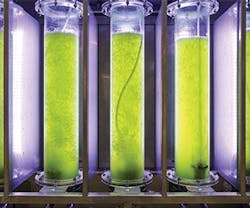Algae Project Aims for Reliable Energy
The Pacific Northwest National Laboratory (PNNL) has put forth a more concerted effort to boost the viability of biofuel with its Algae DISCOVR Project, a $6 million collaborative plan to discover which algae species are the most promising for renewable energy.
The goal of the Algae DISCOVR Project – short for Development of Integrated Screening, Cultivar Optimization and Validation Research – is to reduce the cost and time necessary to bring algae into biofuel production. Looking at 30 candidates, scientists hope to find four promising algae strains by the end of the three-year pilot.
“Algae biofuel is a promising clean energy, but the current production methods are costly and limit its use,” says the project’s lead researcher, Michael Huesemann of PNNL. “The price of biofuel is largely tied to growth rates. Our method could help developers find the most productive algae strains more quickly and efficiently.”
PNNL is leading the program out of its Marine Sciences Laboratory in Sequim, WA, and it includes researchers from Los Alamos National Laboratory, National Renewable Energy Laboratory, Sandia National Laboratories and Arizona State University’s Arizona Center for Algae Technology.
“Our method could help developers find the most productive algae strains more quickly and efficiently.”
—Michael Huesemann, lead researcher
This group will seek to produce results where others have failed to adapt algae into a reliable biofuel. While they have found results in the lab, they have not been able to yield the same promising results when tested in outdoor ponds.
The Project’s Approach
In order to bridge the gap in results between the lab and outdoors, PNNL is attempting to mimic environmental conditions. Its Laboratory Environmental Algae Pond Simulator (LEAPS) mini-photobioreactors replicate the shifting water temperatures and lighting conditions that occur in a given outdoor pond. Situated in glass columns with different strains of algae, the LEAPS mini-photobioreactors undergo exposure to unique temperature and lighting changes.
The researchers will then assess the growth rates of each strain of algae, while also measuring oil, protein and carbohydrate content because of their potential to create biofuels.
The strains that produce 20% more biomass than previously studied algae strains will then be tested under more extreme conditions to test their resilience, survival and evolution.
The strongest strains will then grow in outdoor ponds in Arizona, where researchers will compare growth with the research conducted in the lab while also harvesting biomass for future research. They will study the algae strains that produce best outdoors under different lighting and temperature conditions and then enter the data into PNNL’s Biomass Assessment Tool to identify the best locations for algae growth.
The hope is that after releasing data to the public, algae companies and researchers will begin to grow the most promising strains. The program also anticipates that this work could include converting harvested algae into biofuels, examining crop rotation and other operational changes, and assessing the overall feasibility of algae as a biofuel.
